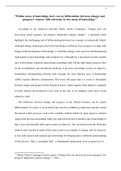Essay
IB Level A TOK essay 2021
- Course
- Institution
IB Level A TOK essay 2021: “Within areas of knowledge, how can we differentiate between change and progress? Answer with reference to two areas of knowledge.” Received a 9/10 by IB exam board.
[Show more]



